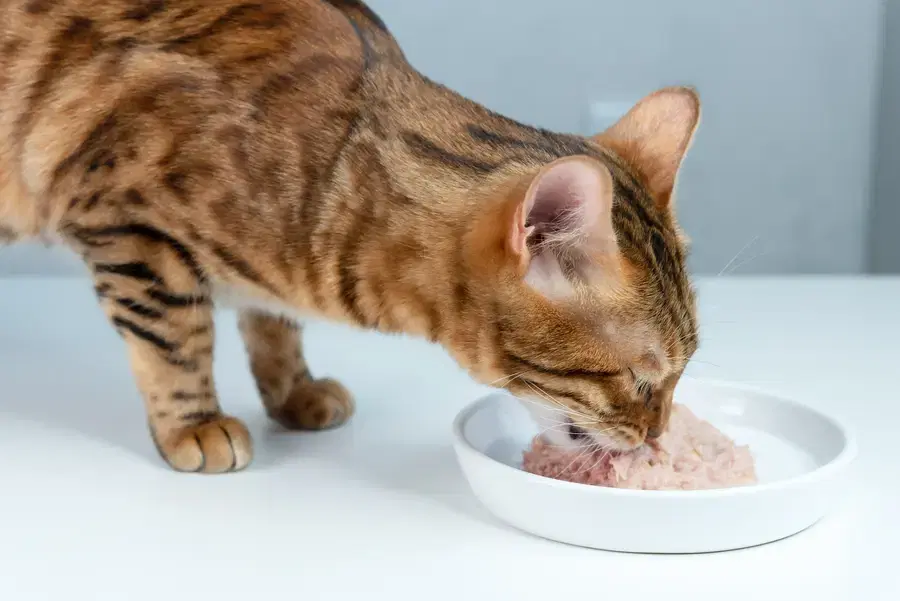Celery, a vegetable touted as nutritious food for humans, has been cultivated and cooked in hundreds of ways by people in every part of the world. Should we also add it to our cat’s breakfast?
Can Cats Eat Celery?
The one-word answer to this question is ‘Yes’, cats can eat celery. It can even be healthy for them. But, before going ahead and placing a big bowl full of celery in front of your cat anticipating all the benefits it can give, it is important to understand the right quantity and way to feed celery to them.
Is Celery Good for Cats?
Cats are carnivorous. So, they are not supposed to be fed fruits and vegetables daily. Most of the vegetables are even toxic for them. But among the few human foods that are safe, celery is one of them.
Celery is rich in various antioxidants that possess anti-inflammatory, antibacterial, and anti-viral properties. Celery also contains a compound called luteolin that can help prevent inflammation in the brain cells. A medium stalk of it (7-8 inches) or say around 40g serving of raw celery consists of the following –
Calories: 5.6
Fat: 0.1g
Sodium: 32mg
Carbohydrates: 1.2g
Fiber: 0.6g
Sugars: 0.5g
Protein: 0.3g
Potassium: 104mg
Sodium: 32mg
Phosphorus: 9.6mg
Potassium: 104mg
Vitamin A: 8.8mcg
Folate: 14.4mcg
Vitamin K: 11.7mcg
Now if this is the deal for humans, it would look like a great deal for cats as well. And it somewhat is. If fed in moderation, celery can prove to be good for cats.
Health Benefits of Celery for Cats
Now that we know that celery is good for your cat, let us dive into the specifics of why celery is good for your cat. Celery seeds and extracts are natural diuretics, i.e., a substance that helps flush salt and chloride from the body in the form of urine. There are several other nutrients that celery provides, and if we were to break down the nutrient values in celery and evaluate each for our cats -
Antioxidants - They play a key role in minimizing damage to cells, including cells of the immune system.
Fiber - Help with digestive functions and benefit the stool quality of cats. It also helps in cases of constipation, diarrhea, diabetes, and even obesity.
Vitamin A – Supports healthy eyes (including night vision) and skin, the formation of organs and structures in growing animals (morphogenesis), and immune function.
Vitamin K – It helps the body form clots and prevent bleeding.
Vitamin C – Helps in tissue growth and maintenance, amelioration of oxidative stress, and immune regulation.
Potassium - Is required for the normal function of muscles and bodily systems.
Iron – Promotes healthy growth and development in young cats.
Sodium – Helps ensure proper nerve and muscle cell functions, maintains a healthy cellular environment, and prevents cells from swelling or dehydrating.
Magnesium - Is responsible for enzyme function and the building of both bones and teeth
Apart from all these, it also supports kidney function.
Do Cats Like Celery?
While we have taste buds that can make us enjoy celery in a particular way, our feline friends have different types of tastebuds. Having said that, there is a high chance that your cat might love celery. It could be for the crunchiness of celery, the smell of it, or even the shape of it. Cats are known to be attracted to textures and shapes that are interesting.
How Much Celery is Good for Your Cat?
Combining all these benefits may make you feel like just feeding celery to your cat the whole day. But we don't recommend doing that. Your cat might not react to celery the way it reacts to catnip. You should start with small quantities of any vegetable to check your cat’s reaction and then add a little more to it. The same goes for celery. Start by feeding a quantity, the size of your fingernail. And if there are no bad reactions, you may add some more. But remember that it’s considered a cat treat and should never exceed 10% of the total calories for the day. The recommended quantity is no more than ¼ cup of finely chopped celery over the span of a week.
How Can You Feed Celery to Your Cat?
The next question in the sequence is how to feed the portion of celery to your cat. Before offering it to your cat, it is important that you know how to serve it.
Whole or diced – Both forms are okay to feed celery to your cat. Especially if you want it to become a nice playing option, you can leave the whole stalk for it to grab and chew
Washed thoroughly –. We do not want any dirt or pesticide to enter your cat’s digestive tract. Hence it is important to wash it thoroughly before chopping.
Juice is okay – Your cat can drink celery juice but not more than one tablespoon of it per day.
Ask before feeding them celery seeds – While the seeds have immense medicinal properties, you should consult your vet before giving any to your cat, because it may have a few compounds that may not suit them.
No fancy – Do not add any type of seasoning to the celery. Butter, garlic, onions, etc. are all a big NO for your cat.
Other ways – The popular lunch box meal, celery, and peanut butter are also safe for cats. But do limit the butter to just a dab and ensure it does not have added salts in it.
What Can Happen If Your Cat Eats an Unusual Amount of Celery?
If you end up feeding a lot of Celery to your cat or it ends up eating a lot of it, while you are on a run or busy getting ready for a date, keep an eye out for the following symptoms of an upset stomach. You should contact your vet right away if you see –
Lethargy
Vomiting
Diarrhea
Which Cats Should Not Eat Celery?
There can be some cats, not specific to any breed which can be more susceptible to stomach harm from Celery. For them, Celery should altogether be eliminated. The list includes –
Cats with allergies or food intolerances – Celery can be cross-reactive with certain allergens. If your cat is allergic to things like mugwort or other grasses, they may also be allergic to celery.
Conclusion
The closing statements are – Celery is safe for your cat to eat. However, you do have to make sure you know the right way, quantity, and frequency of feeding it to them. It should be an occasional treat and not a part of your cat’s daily diet. If you stick to the rules, your cat may be able to extract many health benefits from celery.
Happy mood and health to your purry friend and lots of love and licks to you! (licks by your cat)

As Spot’s resident cat enthusiast, I am dedicated to researching and sharing information that helps pet owners take the best care of their pets. Pet ownership comes with it’s share of challenges, but my goal is to help make this journey easier.
*Jan 2019 to Aug 2024 Spot Pet Insurance Services, LLC claims data.
Copson, Kit. “Can Cats Eat Celery? Vet-Reviewed Nutrition Facts & FAQ.” Catster, 1 Oct. 2024, www.catster.com/nutrition/can-cats-eat-celery/.
Cervoni, Barbie. “Celery Nutrition Facts and Health Benefits.” Verywell Fit, 9 Jun. 2024, www.verywellfit.com/celery-nutrition-facts-calories-and-their-health-benefits-4115076.
Sawatzky, Jasmine. “Can Cats Eat Celery?” Wag Walking, 13 Mar. 2023, wagwalking.com/wellness/can-cats-eat-celery.
The information presented in this article is for educational and informational purposes only and does not constitute or substitute for the advice of your veterinarian.












